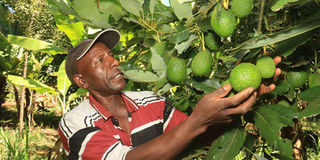New farm produce markets hold promise for national economy

Avocado farming in Nyeri. The global market access for Kenya’s agricultural produce must translate to practical solutions to youth unemployment and underemployment. PHOTO | JOSEPH KANYI | NATION MEDIA GROUP
What you need to know:
- Youth inclusion into agriculture is imperative not only to food security, but also to curb the increasing social spiral into crime.
- It would be a wasted opportunity if these lucrative markets do not yield tangible benefits like solving challenges such as youth unemployment and food insecurity.
Kenya has made commendable progress in accessing global markets for horticultural produce.
In the past six months, President Uhuru Kenyatta has taken charge in securing markets for Kenya’s fresh produce in China and, more recently, Mauritius, albeit with some conditions.
These are welcome developments, given that one of the biggest constraints to our agricultural economy is ensuring the large quantities of our agricultural output find suitable markets.
Agriculture is key to poverty reduction and economic growth not just in Kenya, but across Africa.
YOUTH
According to the United Nations, over three quarters of Africa’s population is under 35. Kenyan youth is over 20 per cent of the population — higher than the world (15.8 per cent) and Africa (19.2 per cent) averages.
Kenya has the highest youth unemployment rate in East Africa. Youth inclusion into agriculture is imperative not only to food security, but also to curb the increasing social spiral into crime that unproductive and disenfranchised youth are vulnerable to.
The global market access for Kenya’s agricultural produce must translate to practical solutions to youth unemployment and underemployment.
As one of the leading producers of horticultural produce, Kirinyaga County stands to benefit from the new opportunities resulting from Mauritius and China’s acceptance of Kenya’s avocado.
QUALITY
Naturally, the more established players and large, profitable private entities are well-positioned to take advantage of these opportunities.
But given the stringent production requirements for export markets, the youth, small-scale farmers, many of whom are women and persons with disabilities, are disadvantaged.
Kirinyaga conceptualised the Wezesha Programme as a people-driven response to the four critical challenges vulnerable groups face in accessing markets in our predominantly agriculture-based economy.
The first challenge we addressed was production, where access to seeds and farming inputs contribute to high costs and lower quality yields that are often rejected by international buyers, rendering farming economically unviable.
The second was post-harvest management, where many farmers lack infrastructure for proper storage, and handling of produce, often resulting in loss of quality and outright rejection.
EMPOWER
The third was processing and value addition, where lack of technical skills and the slow pace in creating an enabling investment environment in manufacturing has disabled the drive towards agro-processing.
Lastly, poor market access resulting from lack of rudimentary infrastructure, such as local market facilities and accessible roads, cost farmers heavily in inclement weather.
Herein is the place for political will coupled with intentional empowerment efforts. The Wezesha vision is anchored on dignity of the people through empowered livelihoods.
It aims to facilitate, support and empower traditionally excluded populations to access markets by solving the challenges and setbacks that lock them out.
The programme galvanises the county government’s development agenda into practical actions that solve challenges using a multisectoral approach.
BENEFITS
The model unifies roads and public works, agriculture, trade and industry, environment and gender initiatives into targeted actions aimed at improving livelihoods and ensuring better income potential in our predominantly agricultural economy.
Citizens can now gain broader benefits from single interventions that feed into a larger objective, as the government plans, prioritises and manages limited budgetary resources for greater impact.
Exploiting these opportunities demands concerted local actions. It would be a wasted opportunity if these lucrative markets do not yield tangible benefits like solving challenges such as youth unemployment and food insecurity.
Ms Waiguru is the Governor of Kirinyaga County. [email protected]





